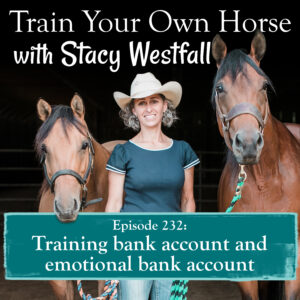Episode 232-Training bank account and emotional bank account
April 26, 2023/

This week, I’m answering a listener question about training vs emotional ‘deposits’ when spending time with a horse.
I answer this question from several angles, including:
-‘earning’ the right to be in their space.
-seeing the horses side of the conversation
– your human view of work
– what Professional trainers must identify
– what non trainers (horse owners) must identify
– DISTRACTED horse…getting ‘rewarded’
– rules, boundaries and training cycles
Can you DEEPLY enjoy all the time spent together…even the ‘work’ parts?
2 Comments
Leave a Comment
SUBSCRIBE TO THE PODCAST HERE:





YOURS FREE
WHY IS MY HORSE...?


Hi Stacy,
How often do you start the resourceful riding program in one year? I know you have one starting up by May 4th. When would the next program open up? I really would love to go through your program!
Thank you, Marie
Marie, The program has LIFETIME access!